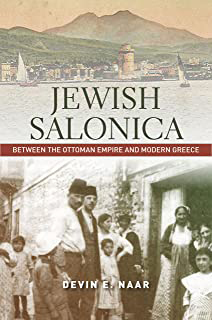"From the Ottoman Empire to Auschwitz" brings together the geography and history of the Ottoman Empire and the Holocaust. The talk broadens our understanding of the Holocaust by acknowledging the tens of thousands of Jews born in the Ottoman Empire who were murdered by the Nazis in the death camps with Salonica being the main focus.
 Devin Naar
Devin Naar
Devin E. Naar is the Isaac Alhadeff Professor in Sephardic Studies, Associate Professor of History, and faculty at the Stroum Center for Jewish Studies in the Jackson School of International Studies. University of Washington.
In his role as founder and chair of the Sephardic Studies program at the University of Washington, Prof. Naar has established the largest digital archive in the US of historical and literary texts in Ladino that has opened the possibility for change in how scholars and the interested public engage with the rich but little know Ladino cultural heritage.
Prof. Naar is the leading scholar of today on the Jews of Salonica and the Sephardic Jews of the Ottoman Empire, including their descendants who have formed the Sephardic community in Seattle.
His book, Jewish Salonica: Between the Ottoman Empire and Modern Greece, was published by Stanford University Press in 2016.
Awards are:
-- 2016 National Jewish Book Award
-- 2017 Edmund Keeley Prize for best book in Modern Greek Studies

Jewish Salonica explores the impact of the collapse of the Ottoman Empire and the rise of modern Greece during the 19th and 20th centuries on the Jews of Salonica (Thessaloniki), an Aegean port city that was once home to the largest Judeo-Spanish-speaking Jewish community in the world. The book traces the multiple ways in which Jews in Salonica grappled with the end of the Ottoman Empire and their new-found position within the context of the Greek state during the early twentieth century. Drawing on a wide range of previously unstudied primary sources, such as archives and newspapers primarily written in Judeo-Spanish as well as Greek, Hebrew, and French, Jewish Salonica is the first book to tell the story of the tumultuous transition from empire to nation-state through the voices and perspectives of Salonican Jews themselves.



